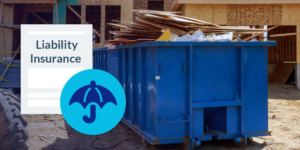
Pollution can be a byproduct of construction work. Contractors work hard to ensure that accidents and leaks don’t happen, but they can’t prevent them all. Pollution liability insurance steps in when toxic substances are spilled or found on a jobsite or in a building. It covers the expense for cleanup, as well as property damage, injuries, and legal defense costs.
You may need pollution liability insurance if your company deals with toxic chemicals or the natural environment. Let’s take a look at what contractors’ pollution liability insurance covers and how to get it.
Learn more about what insurance you might need: Common Types of Insurance for Construction Businesses
What does contractors’ pollution liability insurance cover?
Contractors’ pollution liability (CPL) policies cover injuries, damages, defense costs, and cleanup as a result of a pollution condition, either sudden or gradual, arising from contractor activity. Emergency response cost coverage is included, and coverage usually extends down the payment chain to include subcontractors. Most pollution claims are not covered by general liability (GL) insurance, so a separate pollution coverage is required for most contractors.
Pollution coverage is available on a project only or blanket operations basis. A project policy will cover the project from construction through completion. A blanket operations policy covers all work done by a specific contractor. Coverage usually includes completed operations for as many as 13 years after the project is complete.
CPL is also available on a “claims made” policy, or by-occurrence policy.
With a “claims made” policy, claims are only paid if they are filed during the life of the policy and a specified time after the expiration of the policy. This limits a contractor’s exposure to future claims past the policy period.
A by-occurrence policy pays claims if the damage occurred during the life of the policy, regardless of when the claim was filed.
What types of contractors need CPL?
Project owners and general contractors may purchase CPL insurance to cover specific projects or all of their work. Certain trades are more vulnerable to environmental risk than others. Companies working in these trades should purchase CPL insurance to make sure their work is covered, no matter whether the owner or GC has purchased it or not.
Trade subcontractors who need pollution liability insurance include:
- Site work and excavation
- Asbestos abatement
- Demolition
- Paving
- Environmental cleanup
- Emergency spill response
- Landscaping
- Drilling
- Roofing
- Siding
- Mechanical (HVAC)
- Electrical
- Plumbing
CPL may also be a contractual requirement. Be sure to read the terms and coverage requirements carefully so you’ll be in compliance.
Examples of pollution liability coverage
A few months after completion of renovations at an elementary school, a teacher became ill, allegedly from odors entering the classroom. A claim was filed against the general contractor alleging that subcontractors created a dangerous environment that led to mold growth, which was causing the teacher’s illness. The teacher was diagnosed with occupational asthma and sought recovery of lost wages. The general contractor had a pollution liability policy covering mold via an endorsement. Although the work was performed by subcontractors, the general contractor was liable for their work and was covered by their policy. The claim was mediated and settled at just over $100,000.
Excessive soil erosion and runoff contaminated a local creek during the development of a residential community. A claim was filed stating that the general contractor and development owner violated the Clean Water Act and state water statutes. The development owner sued the general contractor for breach of contract due to this negligence. The general contractor was covered under a pollution policy with an endorsement for silt and sedimentation. This policy covered the damages caused by the runoff and the claim was settled for less than $100,000.
How to get contractors pollution liability insurance
CPL insurance is available from both standard insurance companies and those that cater to the construction industry. It can be purchased as a standalone policy or as part of a package including general liability and workers comp coverage.
Regardless of what you choose, operating a contracting business without insurance invites a lot of risk.